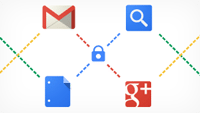Why Google’s Privacy Changes (And The ‘Data Tidy Up’) Moves Everything Forward
Google has handled its privacy debate by being disarmingly clear with a little note left on the fridge the other week.
We’re tidying up and love data too much to not want to connect it better.
Like it or lump it.
Love Google.
 It’s their right – they are after all a private company and not the public service we somehow feel them to be. Google wants to “create a beautifully simple, intuitive user experience” and its data consolidation is what will help it do this. Facebook makes one product called Facebook while Google up until now has chosen to run many nom de plumes, betas, and side initiatives. I’d like to see a more capable ‘joined up’ Google sparring with Apple and Facebook on who can do the coolest and most useful things for people using data. In truth, the Google engineering team must be relieved to ditch the sticking plasters and chewing gum connecting the hitherto disparate data sets they manage.
It’s their right – they are after all a private company and not the public service we somehow feel them to be. Google wants to “create a beautifully simple, intuitive user experience” and its data consolidation is what will help it do this. Facebook makes one product called Facebook while Google up until now has chosen to run many nom de plumes, betas, and side initiatives. I’d like to see a more capable ‘joined up’ Google sparring with Apple and Facebook on who can do the coolest and most useful things for people using data. In truth, the Google engineering team must be relieved to ditch the sticking plasters and chewing gum connecting the hitherto disparate data sets they manage.
 Data isn’t something you set free or conversely even hide. It’s something that you give more data to and see what new stuff it can come up with. Google, Facebook, Microsoft, Apple and all the other big personal data holders know this. These companies are at the forefront of the semantic web and are chasing down the promise of more, faster and smarter. We have enough data now to begin inferring something new and useful from it. Of course, in order to get big insights from big data we have to reduce the volume of human effort — we can’t keep confirming and thumb scrolling through ‘permissions’ dialogues for each data exchange. At some point we need to permit companies to infer on our behalf if we want the dialogue to move up a gear. It’s a leap of faith.
Data isn’t something you set free or conversely even hide. It’s something that you give more data to and see what new stuff it can come up with. Google, Facebook, Microsoft, Apple and all the other big personal data holders know this. These companies are at the forefront of the semantic web and are chasing down the promise of more, faster and smarter. We have enough data now to begin inferring something new and useful from it. Of course, in order to get big insights from big data we have to reduce the volume of human effort — we can’t keep confirming and thumb scrolling through ‘permissions’ dialogues for each data exchange. At some point we need to permit companies to infer on our behalf if we want the dialogue to move up a gear. It’s a leap of faith.
So how will this affect Interactive Marketers in the here and now? Search relevance will improve and this is good news (albeit unproven) if you are running a PPC and/or mobile advertising program. The impacts for the future of IM are much larger — marketers will be able to have deeper engagements with prospects and customers underpinned by rich semantic insight.
Is Google prepared for yet another examination by authorities in 2012? Privacy legislation is maturing in both the EU and the US and the threat of enforcement feels like it's drawing closer. Here’s a snapshot:
- It has a clear PR for its privacy approach. The Privacy Policy itself (i.e. public contract) communicates the breadth and depth of its capability around how it uses data but it is in mar-tech speak – your Aunty won’t understand it and an illustration or two wouldn’t hurt here.
- It mostly uses its own cookies. A mix of DoubleClick, Google Analytics, and AdSense are on most Google properties. It has control, knows exactly what is in its cookies and why. Further steps here would be to surface the data in these cookies so customers can peer inside (and even correct) if they are so inclined.
- It has features that allow users to control their behavioral targeting. Users can turn on and off their own segment profile data by degrees. This is a very big deal and hardly any other behavioral targeting engines can or wants to do this.
- It is working on two key use cases that companies may formally need to provide in 2012. By joining up their view of you they are much more likely to be able to deliver on ‘show me everything you have about me’ and subsequently ‘delete everything about me."
- It put its ‘Privacy’ button high in the menu hierarchy (not in a footer), which scores a plus but there are too many clicks before you can begin to edit anything around targeting. If the design is supposed to put you off getting to the config page then at least it’s designed to spec.
It is playing a blinder and believably tick the open, honest, and transparent boxes. They will keep innovating and they will keep leading us forward. Great art and science is hardly ever made by consensus and we should see Google as a Da Vinci and not an Angela Merkel.
How would your company fare under similar scrutiny? Do you have 4 or 5 different types of cookies on your site and could you justify your use of them if not to a government body then to a newspaper? Could you bring together all the data you hold about customers if asked? Do you really know how your off-site display marketing works?
What should IM’s do and what can they learn from Google's approach?
- Begin explaining what you are doing with the data. Follow Google's lead and explain to customers why it’s a good thing you are tracking this data and how doing so makes their experience more meaningful and fun. Your front page works best. The Facebook cat and mouse game doesn't work and only engenders mistrust.
- Evaluate the behavioral targeting solutions you are using. Do they have options for consumers to modify what data is used? Are there links from advert copy to a management panel for configuration? Can you explain to customers why they received an advert or a recommendation? If your BT provider doesn’t seem to care about these issues then I recommend you begin to shop around — soon Ad Networks and Exchanges will need to show differences not just in lift but in control and transparency. Their membership in the DAA, NAI, or other body is not enough – think 3 years ahead not 1.
- Interactive Marketers must spearhead the maturity of online dialogue. In truth a bidirectional metered conversation with customers will ultimately be richer and more fun. This is the direction things are heading, and the Privacy debate is one stepping-stone toward this. If you have a reader's license then check out my report on how to transform your dialogue with customers.
In order for the data insight and automation to continue the public will have to own their data in some meaningful way. The data owners are the new banks and the emerging timeline seems to be:
- Pre-2009: listening and mostly a one way dialogue — covert selling.
- 2009-2011: greater public awareness and recrimination over data (ab)use
- 2012-2013: consolidation of data and new contracts with the public — explored and pushed by legislation.
- 2013 onwards: richer agreements around automated use of customer data. The semantic web has a chance to flourish.
On Monday, Pablo Chavez (Google's director of public policy) stated to U.S lawmakers "the updated privacy policy does not allow us to collect any new or additional types of information about users." Maybe Google doesn’t need any more new data points — it has enough to seed new insights about us already.